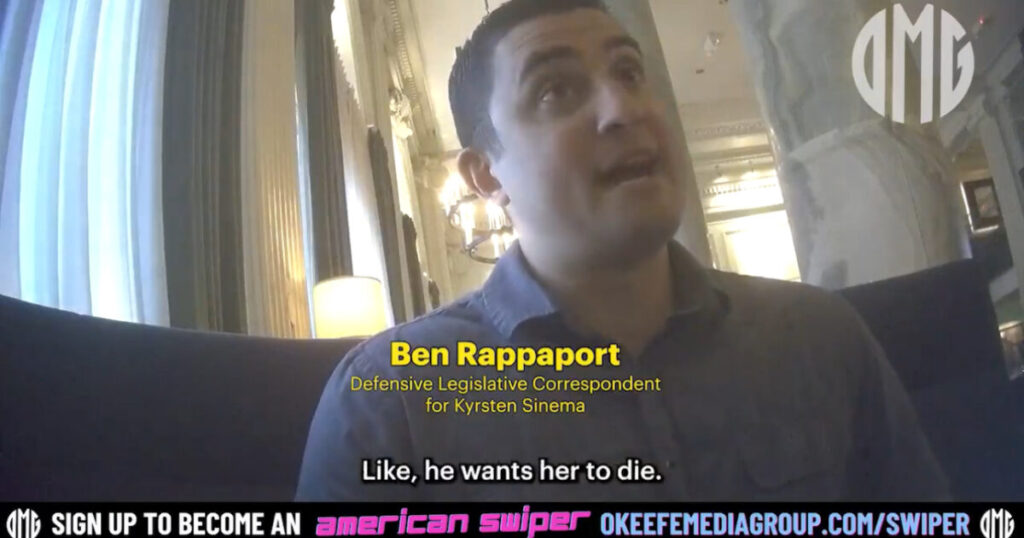Recently, an undercover investigation by the O’Keefe Media Group (OMG) revealed allegations from Ben Rappaport, a former aide to Senator Kyrsten Sinema (I-AZ), regarding Democrat Senate candidate Ruben Gallego and his sentiments towards his opponent, Kari Lake. Rappaport disclosed a shocking claim in which he described Gallego as having a deep-seated animosity toward Lake, stating that Gallego “f*cking hates” her and allegedly “wants her to die.” Rappaport’s comments paint a picture of Gallego as someone who holds extreme views against conservative figures, particularly Lake, who is currently in a tight race for the Senate seat that is being vacated by Sinema. This revelation adds a dramatic layer to an already contentious electoral battle, highlighting the intensity of political emotions within the campaign dynamics.
Rappaport’s remarks extend beyond his comments about Gallego to include criticisms of Sinema herself. He indicated that within the Democratic Party, Sinema is viewed as a “disappointment” due to her perceived lack of liberalism. He portrayed her as mentally unstable, suggesting that she sees herself “as a raving lunatic and a threat to democracy.” This assertion, combined with Gallego’s alleged death wish for Lake, paints the narrative of a fierce political rivalry characterized not merely by ideological differences but by personal hostility. Rappaport’s candidness raises broader concerns regarding the mental well-being and the attitudes of political figures towards their opponents, particularly when such sentiments are seemingly steeped in violence or harm.
In response to Rappaport’s allegations, Kari Lake publicly reacted by highlighting Gallego’s familial connections to alleged criminal activities, specifically mentioning ties to drug cartels through his father. She expressed deep concern for her safety and that of her family, calling for law enforcement to investigate the threats allegedly stemming from Gallego. This public confrontation adds another layer to an already charged political landscape, illustrating how personal attacks and accusations can reverberate within the context of a tight election, further complicating the candidates’ public personas and influencing voter perceptions.
As the race unfolds, polling data points to a fiercely competitive environment, with reports indicating that the margin between Lake and Gallego has shrunk to just 1.5%. The ongoing ballot counting continues to favor Lake, raising questions about the strategies and narratives at play in an increasingly polarized political atmosphere. This tight margin demonstrates the stakes involved for both candidates and underlines how critical public sentiment and media coverage are as they interact throughout the campaign.
Rappaport also commented on Sinema’s possible aspirations for future positions, particularly her rumored interest in becoming the president of Arizona State University (ASU). He claimed that there exists an “unwritten rule” in her office favoring ASU’s interests, reflecting a level of prioritization that could be perceived as corrupt or questionable. Rappaport speculated that by aligning her legislative actions with the needs of ASU, Sinema could secure a favorable reputation that would benefit her ambitions in the academic sphere after her political career possibly concludes. This assertion raises ethical concerns regarding the intertwining of educational institutions and political influence and how such relationships could shape legislative actions.
Arizona State University, when approached about these allegations, did not deny them but directed inquiries about leadership appointments to the Arizona Board of Regents, indicating a degree of separation from Sinema’s influence. Such responses can be interpreted as evasive, perhaps acknowledging the potential implications of political connections on institutional leadership without directly addressing the possible quid pro quo scenarios outlined by Rappaport. This lack of clear denial opens the door for further scrutiny into the relationships between state legislators and educational institutions, especially in a climate where accountability in both sectors is increasingly demanded by the public.
In summary, the allegations made by Ben Rappaport against Ruben Gallego and Kyrsten Sinema uncover a potentially toxic political environment characterized by personal animosity, ethical concerns, and a close electoral race. The interplay of these narratives provides insight into the motivations driving candidates on both sides and highlights the role that personal attacks and fears over safety can play in shaping voter sentiments. As the election draws nearer, the implications of this exposé may resonate well beyond the current campaigns, prompting further discussions about the state of political discourse and integrity in both political and educational institutions.

